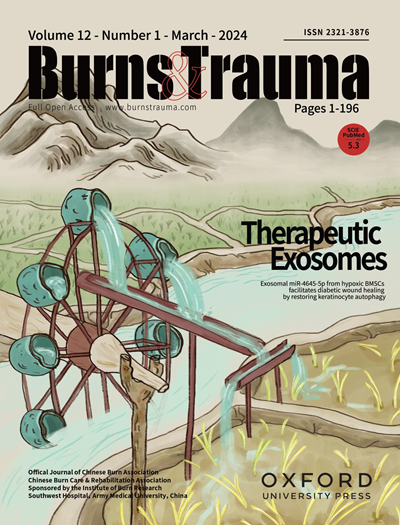我们能否预测钝性脾损伤非手术治疗的失败?直接脾切除术与继发于非手术治疗失败的脾切除术的预测因素比较
IF 6.3
1区 医学
Q1 DERMATOLOGY
引用次数: 0
摘要
脾脏是钝性创伤后最常见的实体器官,非手术治疗已成为血流动力学稳定患者的标准治疗方法。目前尚不清楚哪些患者在初次就诊时非手术治疗失败(NOMF)的风险增加。我们探讨了包括当代旋转血栓弹性成像(ROTEM)参数在内的临床变量是否可以预测NOMF。回顾性收集了2005年至2021年间加拿大多伦多圣迈克尔医院所有钝性脾损伤成年患者的数据。出现症状后4小时内行脾切除术者归为直接手术治疗(OM),观察4小时后行脾切除术者归为NOM失败。收集患者到达时的生命体征和损伤特征。采用Logistic回归识别OM的预测因子和NOM失败的预测因子。在我们的研究期间,有717例患者被确定为脾损伤。损伤严重程度评分(ISS)中位数为27 (IQR 17-36), 19% (n = 134)患者休克指数为1及以上。111例(15.5%)行直接手术治疗。休克指数高于1和脾脏损伤严重程度增加是直接OM患者的强预测因子。其余606例患者接受NOM治疗,其中59% (n = 357)入住ICU。7.4% (n = 45)的患者发生了NOM失败,到NOM失败的中位时间为23 (IQR 8-72)小时。美国创伤外科协会(AAST)脾脏损伤严重程度是与NOM失败显著相关的主要因素。到达时NOMF的唯一主要预测指标是脾脏损伤程度的增加。其他临床变量如年龄、到达时的生命体征和血检不能显著预测NOM失效。需要进一步的研究来确定NOM失效的新预测因素。本文章由计算机程序翻译,如有差异,请以英文原文为准。
Can we predict failure of non-operative management of blunt splenic injuries on arrival? A comparison of predictors of immediate splenectomy versus splenectomy secondary to non-operative management failure
The spleen is the most frequently injured solid organ after blunt trauma and a trial non-operative management (NOM) has become the standard of care in hemodynamically stable patients. It remains uncertain which patients are at increased risk of non-operative management failure (NOMF) at initial presentation. We explored whether clinical variables including the contemporary rotational thromboelastography (ROTEM) parameters are predictive of NOMF. Data for all adult patients with a blunt splenic injury was collected retrospectively at St. Michael’s Hospital in Toronto, Canada between 2005 and 2021. Those who underwent a splenectomy within 4 hours of presentation were classified as direct operative management (OM), while those who had a splenectomy after 4 hours of observation were classified as NOM failure. Vital signs on arrival and injury characteristics were collected. Logistic regression was used to identify predictors of OM and predictors of NOM failure. Seven hundred and seventeen patients were identified with splenic injury during our study period. The median Injury Severity Score (ISS) was 27 (IQR 17–36), and 19% ( n = 134) had a shock index of 1 or more. One hundred and eleven (15.5%) underwent direct operative management. A shock index above 1 and increasing spleen injury severity were strong predictors of patients undergoing direct OM. The remaining 606 patients underwent NOM of which 59% ( n = 357) of these were admitted to the ICU. NOM failure occurred in 7.4% ( n = 45) with a median time to NOM failure of 23 (IQR 8–72) hours. The American Association for the Surgery of Trauma (AAST) spleen injury severity was the major factor significantly associated with NOM failure. The only major predictor of NOMF available on arrival is increased spleen injury grade. Other clinical variables such as age, vital signs on arrival, and bloodwork were not significantly able to predict NOM failure. Additional investigation is required to identify novel predictors of NOM failure.
求助全文
通过发布文献求助,成功后即可免费获取论文全文。
去求助
来源期刊

Burns & Trauma
医学-皮肤病学
CiteScore
8.40
自引率
9.40%
发文量
186
审稿时长
6 weeks
期刊介绍:
The first open access journal in the field of burns and trauma injury in the Asia-Pacific region, Burns & Trauma publishes the latest developments in basic, clinical and translational research in the field. With a special focus on prevention, clinical treatment and basic research, the journal welcomes submissions in various aspects of biomaterials, tissue engineering, stem cells, critical care, immunobiology, skin transplantation, and the prevention and regeneration of burns and trauma injuries. With an expert Editorial Board and a team of dedicated scientific editors, the journal enjoys a large readership and is supported by Southwest Hospital, which covers authors'' article processing charges.
 求助内容:
求助内容: 应助结果提醒方式:
应助结果提醒方式:


